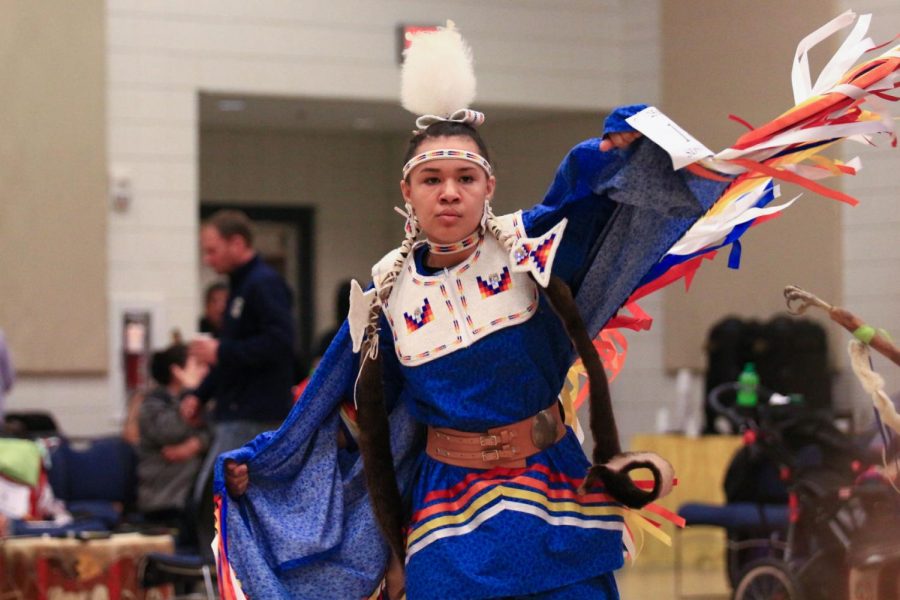Wacipi to connect groups with dance and tacos
The annual wacipi, Lakota for powwow, is a social gathering that brings SDSU students, faculty and community members together with tribal communities. The event features music with dance performances and contests for participants of all ages. Indian tacos and various goods are also sold. The wacipi is from 1 to 9 p.m. on Saturday in the VBR in the Student Union.
March 29, 2017
The annual wacipi celebrates traditions and bringing people together.
Retired English professor Chuck Woodard, who helped establish the wacipi, has attended every single year and can attest to that. Woodard brought his children to the wacipi as they grew up, and now attends with his grandson.
This weekend’s 26th annual wacipi promises an opportunity for students and community members to come together with Native American groups through music, dance and Indian tacos.
The wacipi, Lakota for powwow, is put together by the American Indian Student Association with help from surrounding tribes and the Native American Club on campus.
The wacipi is a social gathering to bring community members, students and tribal communities together to celebrate tribal traditions, according to April Eastman, director of American Indian Education & Cultural Center (AIECC).
The South Dakota State University wacipi was formed by past co-advisers of the Native American Club, Woodard and Velva-Lu Spencer, past Native American adviser at SDSU.
Woodard said his and Spencer’s vision for the wacipi was inspired by other wacipis they attended.
“We wanted to provide SDSU students and faculty members with opportunities to experience firsthand the strength and beauty of tribal cultural traditions,” Woodard said.
Part of the day’s events include Indian taco sales, music, dance contests and vendor booths. Vendors come from around the region, some as information booths on various tribal matters, others sell items such as beadwork or dance regalia.
Morgan Catlett-Ausborn, program coordinator and retention adviser for the American Indian Student Center, said one of her favorite parts of the day is the opening grand entry, which includes students carrying flags representing all South Dakota tribes and dancers performing as they enter the ballroom.
Dance competitions are held for “tiny tots,” juniors, teens, adults and “golden age” participants (age 55 and older). Competitive dance categories include grass dancing, fancy dance, traditional dance and more.
Additionally, distinguished alumni are honored between competitions and a recipient will be presented with a star quilt.
The wacipi is an open event to which all are welcome.
“We try to make it the best program possible — we do it for students, not only to bring our communities together, but to give students a unique cultural experience,” Catlett-Ausborn said.
Graduate student Alaina Hanks said she felt pride and responsibility in helping plan the event.
“I think there’s a sense of honoring the work of those who came before you with the wacipi,” Hanks said. “The students created this powwow to bring Native communities and SDSU together.”
Eastman believes the wacipi upholds this mission and serves as an open door between communities.
“It helps build bridges and further develop relationships,” Eastman said.
Hanks said she would love to see more campus involvement in the wacipi through the stages of planning, fundraising or volunteering to foster stronger, consistent relationships across communities. She encouraged students to check out the wacipi for two main reasons.
“Powwows are generally fun events. There’s dancing that you typically don’t see and music you won’t hear outside of a powwow,” Hanks said. “We’ll be selling Indian tacos and Indian tacos are delicious, so why would you want to miss out on that?”
Woodard, too, encouraged students to engage in this event and iterated the value of the annual powwow.
“The wacipi is a wonderful opportunity for our students to experience diversity and learn to appreciate it, and to become better acquainted with the tribal people who are our neighbors,” Woodard said.
Eastman said her tribal community in Sisseton has suffered the loss of several loved ones in recent months, and the wacipi will be a renewed energy for her people, as well as students. She emphasized her gratitude for the way the wacipi brings people together.
“The wacipi is a special type of energy — it’s a good, positive energy. Our people are looking forward to the powwow, it’s good medicine for people,” Eastman said. “It’s an opportunity to create friendships and to renew them.”
The sense of community built at the wacipi is what Hanks appreciates.
“It’s very easy to feel alone on this campus as a Native student, but the fact that we have 26 years of this powwow is a testament to the presence of Natives on this campus,” Hanks said. “I think we need to continue to carry that forward and show communities that we welcome Native students here at SDSU.”
Admission to the wacipi is free for students with an ID as well as children and seniors over 55. General admission is $6. The wacipi runs from 1 to 9 p.m. Saturday in the Volstorff Ballroom (VBR) in the Student Union.
























